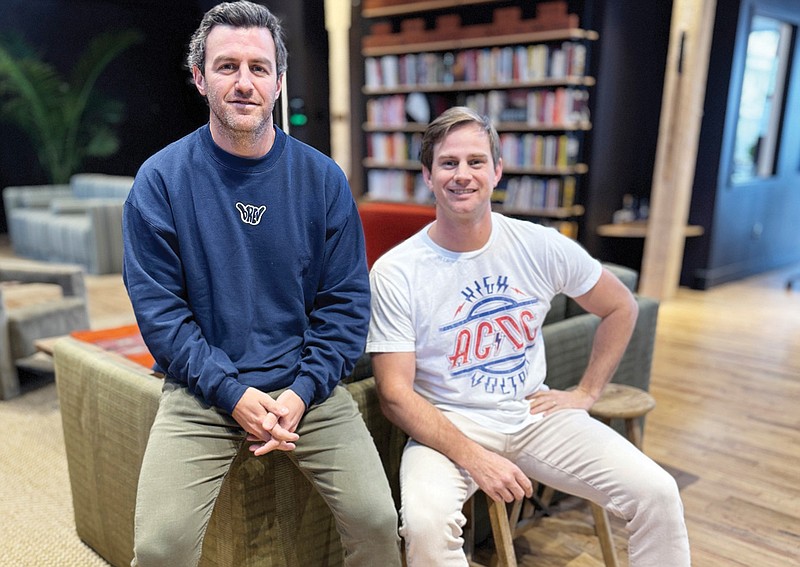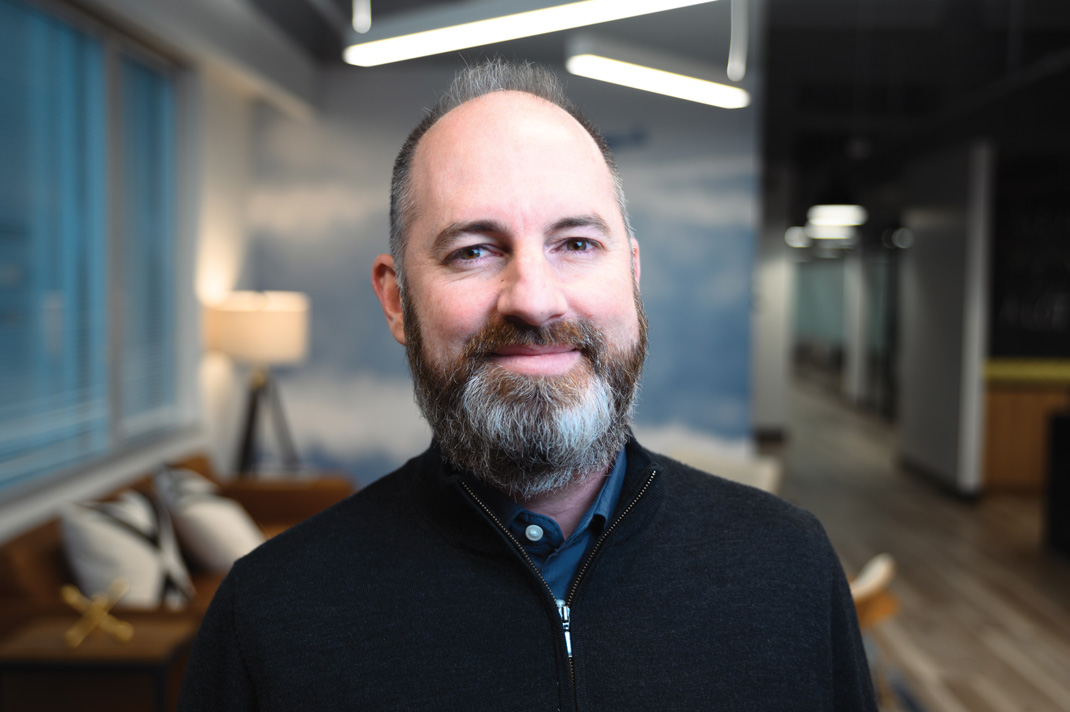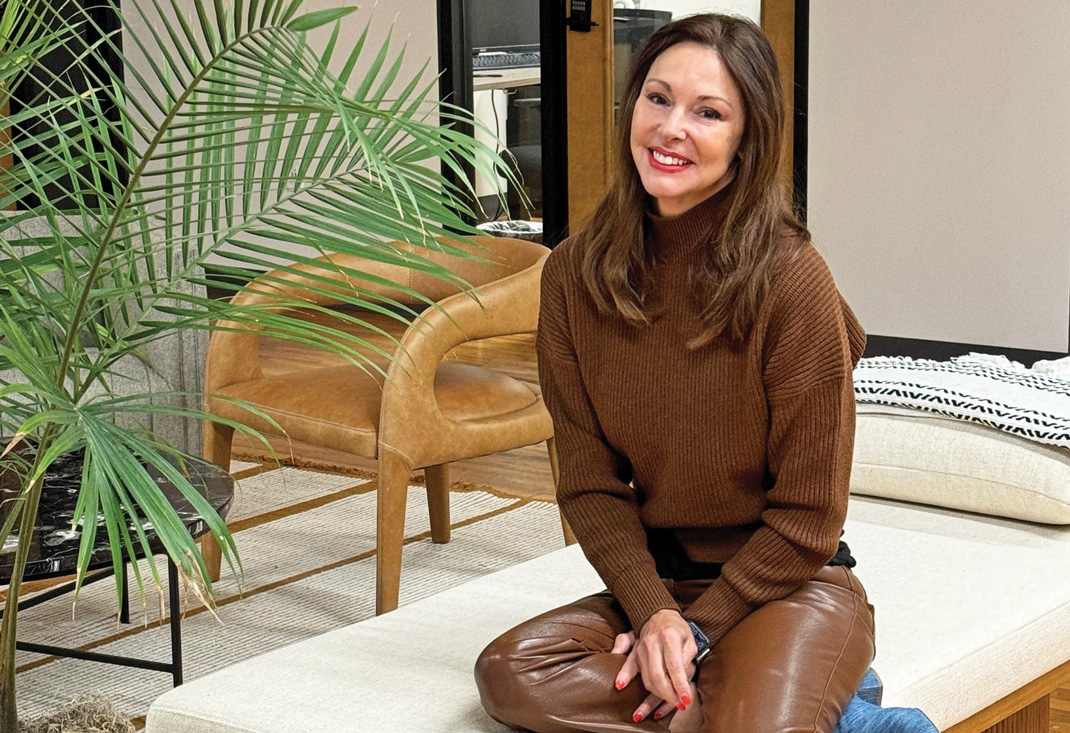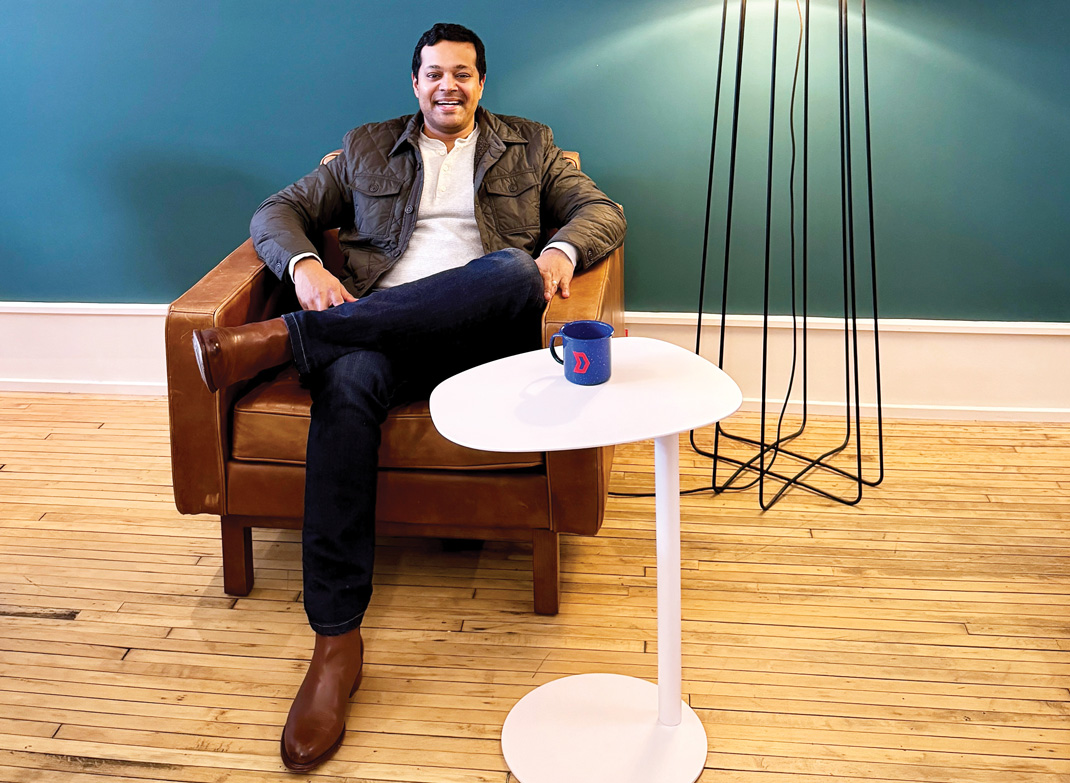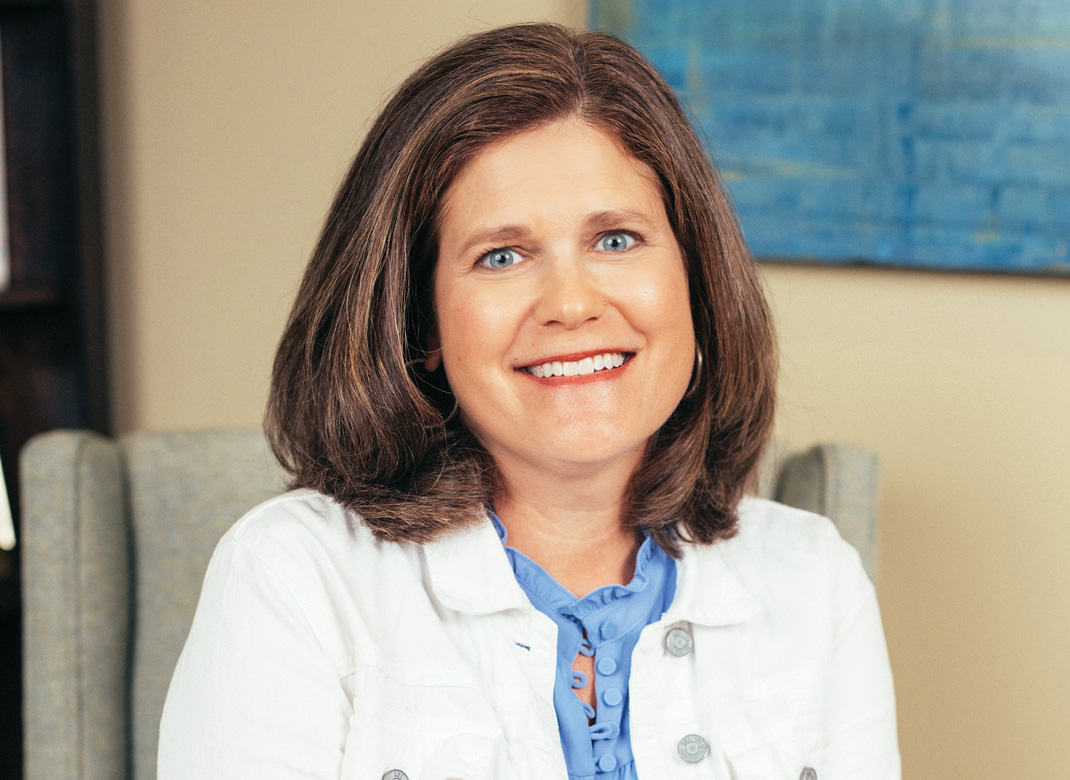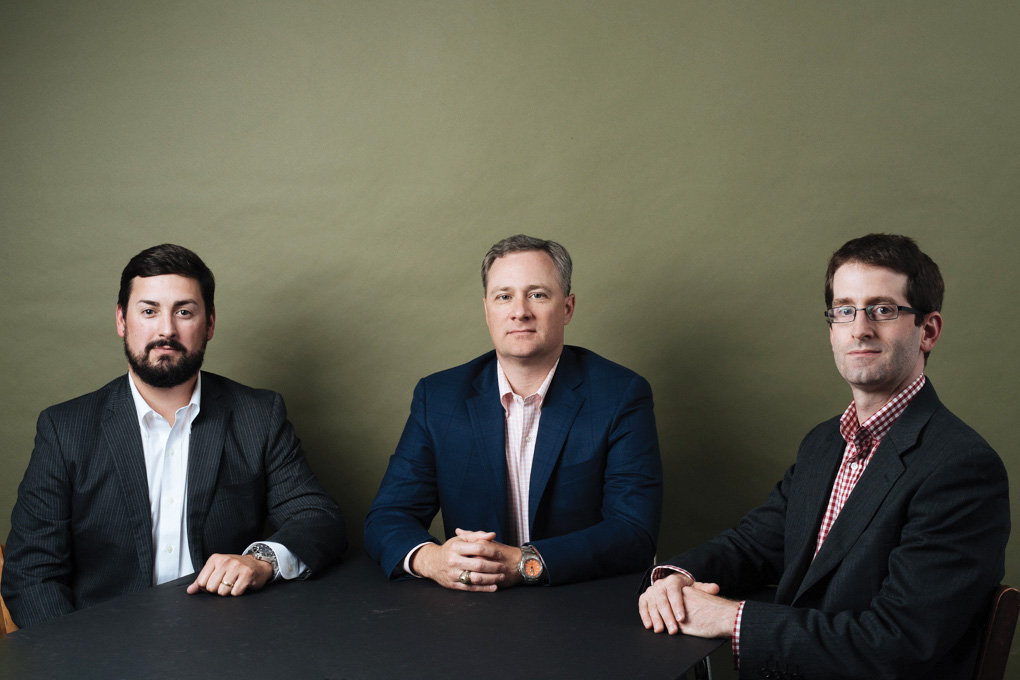You've crafted what could be a billion-dollar business solution, but there's still a big piece of the puzzle that's missing: the money it will take to bring it to life.
Seeking an investor could be the key. But that's a challenge, too -- finding the right group and the right kind of funding.
So, what interests Chattanooga's business investors? What qualities do they look for? And is there enough money in Chattanooga for businesses to scale up?
We asked several local groups these questions and more.
BRICKYARD
* Founders / Key Figures: Matt Patterson, Cam Doody, Barry Large, Ted Alling, Allan Davis
* Founded: 2021
* Core Focus: Pre-seed & seed stage technology companies
* Notable Investments: REPOWR, Krepling, Joon, Coast
1. What criteria or qualities do you seek in potential investments? What sectors or industries are of particular interest to your firm?
We consider ourselves to be "category agnostic" venture investors -- investing in companies across the board when it comes to technology verticals. We've invested in sectors like biotech, gaming, supply chain logistics, consumer marketplaces, deep tech.
We look for what we think can be high-growth companies that will take 10 or so years to build. Just as Matt Patterson and I did with Bellhop, our portfolio teams relocate to Chattanooga indefinitely to remove all distraction, put in serious hours, and reach Series A metrics.
Really, you're looking for the needle in the haystack. The best seed investors in the world will tell you there's no possible way of knowing. You just have to create a thesis around what you believe -- what haystacks may contain needles.
We don't focus on a particular category of business that we claim to know how the future is going to shake out. We believe we know the types of founders that are most likely to build those, and who can endure the 10- to 12-year grind. We are stylistic investors.
We look for founders who have a non-obvious vision -- those who aren't looking at a recurring solution that's been tried a thousand times. Our founders are presenting things that sound crazy and wild and bizarre almost.
We look for founders who have a heads down approach and a radical focus. The ones we choose know the deal -- they are relocating to Chattanooga and building inside, removing all distractions.
We look for pack animals. We look for teams that value running with a pack, where everybody has their own roles and takes pride in their part, and just seem to be synced with full faith in their leader. For our founders, 50 hours a week ain't it. Here, you're agreeing to put yourself inside of a pressure cooker, and being pushed to the max.
We look for founders who are delusionally optimistic. One of the greatest gifts a founder has is the true inability to understand what they're up against. It's kind of a David and Goliath situation. We want people who think, "Of course we're going to take down this giant with limited funding." You have to find the founders that are completely irrationally confident and truly don't know what they're up against.
We look for founders who are learning machines, who are craving knowledge. Because you can have an idea for a solution, but the only way you're going to solve it is to understand the problem deeper than anyone else on Earth. What's the fully-reduced, brass- tax problem? What is the root? And then you have to get creative on how to solve that. And the only way you get there is by being almost neurotic about learning.
And we do box checks: Do we believe in the future relevance of the vertical? Do we believe the market is big enough to warrant a venture investment -- that is, if this company succeeds do we believe our investment could return our entire fund? Do we believe their team has the chops to technically and operationally pull it off; and are they expecting to grind on this problem for a decade?
2. Are there any emerging trends in the business landscape that you anticipate will impact investment strategies?
Startups became part of pop-culture somewhere along the way, but the reality is, starting and scaling a venture- backed company is not glamorous. We're focused on venture capital's trending return to reality, backing capital-efficient founders who want to build and sell a big company, not be in Forbes 30 Under 30.
If you're investing based on trends, you're already in a losing battle in venture capital. You have to see things before they become mainstream.
From about 2018 to 2022, the investment landscape has just been in "Lala Land." Venture capital went through a bubble, which started a little before the pandemic and certainly after. So many funds raised capital in 2020 and 2021 and started deploying capital without doing diligence on the companies they were investing in, which caused the industry to overheat.
That bubble has popped over the last year, and venture investors are returning to reality -- trying to be good stewards of the capital, diligently working through the process.
Money was so easy during those years, founders started spending money without concern as to how it was being deployed. You had founders during that bubble flying first class, traveling to Portugal, going to parties. Brickyard is a complete departure from that. That's not how you build a big company. You build a company by locking yourself in a room for four years and working non-stop.
3. What advice would you give to local entrepreneurs seeking investment or looking to grow their businesses?
Venture capital doesn't make sense for most companies, so be sure it is the right financing option for what you want to build. If you want to grow at a painful rate for 10 years, and sell for $500 million or more, venture capital probably makes sense. If not, there are much better options that will make your life more enjoyable.
Venture capital as an asset class has to push its companies towards truly extraordinary outcomes in order to return capital to their investors, so alignment around expectations between founders and venture capital firms is essential. You have to be sure venture capital is the financing you really want. You've got to know what you're getting into.
Our founders are Olympians. And becoming an Olympian is going to take just about everything you have to give, and you're not guaranteed a medal. The people who trained and funded you, if you don't win a medal -- they didn't get what they wanted out of the deal. Founders need to understand, you take venture capital when you want to build a really large company. If you want to sell your company for a billion, venture capital is probably the right option. If you want to sell for $50 million or even $100 million, it probably isn't right.
It's kind of like putting rocket fuel in a pick-up truck. You have to put rocket fuel in a rocket. If the thing you're building isn't a rocket, the stress is going to rip it to pieces.
4. What is the startup climate in Chattanooga in terms of funding? Is there enough money here for companies to scale?
I would guess Chattanooga seed investors, as a whole, are probably funding 20% of new venture-worthy startups per year, with Brickyard doing 10 to 12 of them. We have a lot of room to grow on the investment side; but the important metric is talent, not funding. Talent in 2024 will live and build where it wants to be. If we continue building a cool city, talent will come and funding will follow.
If you are a founder who has a legitimate venture-worthy opportunity, it honestly doesn't matter where the money is. Money is going to go after the best opportunities. I don't think having a local base of venture capitalists is that important in 2024. When we raised money for Bellhop, less than 3% came from local investors. But even if we started our company today, we could build in Chattanooga and raise seed capital from Denver.
In fact, it's probably better if we're attracting money from other places to companies who are building here. I think most people think local funding is the hindrance to starting companies in Chattanooga, and that's not the case. We have to be a place where people want to build.
CAPACITY CAPITAL
* Founders / Key Figures: Jonathan Bragdon (with three local partners and a national group of venture partners)
* Year Founded: 2020
* Core Focus: Seed stage
* Notable Investments: Parlay, WYRE, PIVIT, PlainSight, Signature
1. What criteria or qualities do you seek in potential investments? What sectors or industries are of particular interest to your firm?
We invest in early-stage companies and look for real, profitable, high-growth businesses with a line of sight to profitability. Most are facing a growth inflection point and need fuel to get through that.
We have no founder criteria for the businesses we work with, but about two-thirds of our 15 investments are led by women, founders of color or veterans. Most high-margin businesses tend to be tech-related or software as a service (SaaS), although we also invest in consumer packaged goods (CPG).
Locally, we have a couple businesses -- WYRE, a cybersecurity tech management company; and also a fishing equipment company called Pivit. We're not focused on a particular sector, but more on the model, and whether they are high-growth, high-margin. We look for talented founders, with some bias toward the Southeast, but they can be from anywhere.
2. Are there any emerging trends in the business landscape that you anticipate will impact investment strategies, especially within Chattanooga?
For investors, there are a couple of things that have shifted. Capacity started during the pandemic and has always focused on profitability and real businesses. But a lot in the venture environment got caught up with valuations going up fast during that time, starting to disconnect from foundational business metrics.
So, the trend is coming back to profitability -- businesses that can get to profitability even when they're growing fast.
More than any other time, the latest tech tools make it possible to build a sustainable high-growth business, with less capital. This gives early-stage funds an advantage over later-stage funds right. Because valuations have gone down for later stages, the next round of investment doesn't increase in value as much, so fewer follow-on investments are being made.
But early-stage companies benefit, especially in tech, because they can build more and raise less. And there is a growing trend of founders using more types of funding in order to maintain independence as they grow.
3. What advice would you give to local entrepreneurs seeking investment or looking to grow their businesses?
Most founders are chasing the check, but need to think about it more like hiring money. Because if the funding doesn't fit with what they're doing, it can be dangerous. And most founders have no idea about that.
Many go after venture capital, thinking that's the only way to grow a fast business, not realizing it will leave them with few options -- that they have to go as fast as they possibly can to get to the exit for their investors. They can't slow down; they can't switch gears; and they don't have control of the company anymore.
Most successful startup companies you don't hear about because they're not big stories. But many times, they delayed getting venture capital or they didn't use it at all. Even in technology, most founders think you have to get venture capital. But three out of four of our exits didn't even use venture capital.
Ultimately, the message for entrepreneurs is that there are many different ways to fund a company, and venture capital should be the last choice. The way a venture fund makes money is that the company they fund has to grow many times bigger, and then they have to sell it. So the companies that do succeed have to be really big. As a founder, what you've done is you've agreed to a binary outcome -- grow really big, really fast, and sell or die.
All funding has constraints, and there are a lot of choices. But founders should be thinking about how to keep their options open. Fewer companies will die if they get their capital stack right.
4. What is the startup climate in Chattanooga in terms of funding? Is there enough money here for companies to scale?
I think this is the wrong question to be asking. Chattanooga has an amazing group of funding choices. We're over-indexed on philanthropy, and have local community development financial institutions (CDFI), credit unions, banks, angel groups and venture funds. We have an active and growing group.
We also have plenty of great startup business support groups. The Business Development Center has done an amazing job. We have Co.Lab, the Urban League, the Center for Innovation and Entrepreneurship (CIE), ChaTech, and the list goes on.
We talk about funding startups, but we need talent to stay here and companies to be built and grow here indefinitely. That's how jobs get created and communities continue to grow. The startup failure rate is high, but talent compounds.
Fuel for business growth comes from two places: customer revenue and funding. Founders are not going to limit themselves to sourcing fuel from one location when customers and funding can be anywhere. It's a false constraint to say we need all the funding here to make it work.
I think the real questions are: How do we create an irresistible environment for talent to repeatedly build and grow thriving businesses? And after defining a problem to solve that can be a business, why do they stay here?
CO.LAB
* Founders / Key Figures: Tasia Malakasis, Kirk Burton, Santosh Sankar
* Year Founded: 2023
* Core Focus: Sustainable mobility and local tech-enabled startups
* Notable Investments: Wooden Spoon Herbs, MarsCharge, FLUIX, Coulomb AI, Xtelligent, Terminus
1. What criteria or qualities do you seek in potential investments? What sectors or industries are of particular interest to your firm?
We announced a new groundbreaking $1.5 million investment fund in January called the Co.Lab Founders Fund. This is the first fund Co.Lab has raised, and it's direct investment into companies we want here in Chattanooga -- startups that are working to solve real world problems for companies that are already here.
For the 2024 cohort, we'll have five teams, including one that is considering Chattanooga as a U.S. home base for their burgeoning business due to the extensive resources our community offers.
For our investment accelerator, we look for companies in the sustainable mobility sector that are technology-related, usually in fields such as electric vehicles or automation. And we want teams that have a minimal viable product, as well as a clear and eminent path to revenue.
We've already taken some investments, and are about 25% of the way there. Those funds will be used for two sustainable mobility accelerators that we'll run in 2025, for a total of up to 12 teams. Our companies will receive $20,000 upon acceptance into the program, and potentially up to $100,000 at the end of the program.
It's our goal, as of now, to invite a company or two for a future investment. We'll be getting to know them, see where they're going, and evaluate for potential acceptance.
2. Are there any emerging trends in the business landscape that you anticipate will impact investment strategies, especially within Chattanooga?
With sustainable mobility, there are always emerging trends that are poised to affect investment strategies. Think about the innovation in delivering goods. We now have drones delivering goods. Or another example would be using electric jets for short commutes.
Then we also have alternative modes of transportation like scooters and electric bikes. We have an initiative from EPB. We have companies that are embracing technological advancements, using robots to do streamlined pick-and-pack operations.
Then we have the rising trend of electric vehicles, and autonomous vehicle testing. All these changes are connected -- how we move through the world, deliver goods and services, and use energy.
3. What advice would you give to local entrepreneurs seeking investment or looking to grow their business?
The biggest piece of advice would be to surround yourself with strong mentors and corporate partners. One of the pieces we have built into our 12-week program/accelerator is that we're giving these companies access to a pilot and first customer -- which is where a big player in the industry will test the product and give feedback. That kind of experience is invaluable to a new company. For startups, I would say, wherever you can, find a partner who will give you buy in.
4. What is the startup climate in Chattanooga in terms of funding? Is there enough money here for companies to scale?
I feel there's this whole renewed excitement in startups and investing. I am still new at CoLab. I've been in this position for just under two years. But when I got started, the angel investment network wasn't very strong. Since that time, VentureSouth, which is a very robust group, has started. Brickyard is going. There's some momentum that's building -- exciting moments, happenings, new funds.
Is there money to scale? Not really. We're not there yet. But we need to get there. And I think we're getting pieces in place.
We don't have many investors who are writing checks in the millions here. When we get into bigger numbers, and we get companies who are looking to scale, we will need larger capital partners.
I think the more we shine the spotlight on the companies building here, the more attractive we make Chattanooga. We're on the rise, and we need to continue with that momentum.
DYNAMO VENTURES
* Founders / Key Figures: Santosh Sankar, Jon Bradford, Ted Alling, Barry Large, Allan Davis
* Year Founded: 2016
* Core Focus: Pre-seed and seed, enterprise supply chain and mobility; global focus
* Notable Investments: Stord, Gatik, Sennder, Steam Logistics, PaintJet
1. What criteria or qualities do you seek in potential investments? What sectors or industries are of particular interest to your firm?
We only make investments related to supply chain and mobility, and focus on the movement of freight. Part of the reason we call Chattanooga home is because of the density of supply chain activity within the Southeast. This makes us a unique partner who can help connect the dots between prospective customers and the startup when we invest in these upstart technology companies.
We invest in companies that have ambitions of growing into large businesses, achieving valuations of a billion dollars or more. And when we invest, we're often the first check the team receives.
When we evaluate startup companies, one of the things we look at first and foremost is the quality of the team, and I use the word "team" intentionally. Building large businesses is very challenging, and having a team of individuals with complementary skill sets greatly increases the chances of success. We also look for "coachability," and by that I mean the ability to listen and absorb information, as we are dedicated to actively supporting the companies we invest in.
Apart from the people, we look at the market potential: Are you focused on a significant problem area that can support a large business? Is there an urgency to solving this problem? And lastly, is it solvable using technology?
2. Are there any emerging trends that you anticipate will impact investment strategies, especially within Chattanooga?
I think we're seeing an interesting trend around remote work. Cities like Chattanooga still haven't fully captured the opportunity as a great place for remote workers.
I also think we are finally seeing a meaningful level of automation having an impact on various roles -- whether it's blue collar, front line or desk/white collar jobs.
3. What advice would you give to local entrepreneurs seeking investment or looking to grow their businesses?
One of the most important things to think about is having a durable business. How are you going to survive when times aren't great?
Beyond that, I would say there are three main things. Firstly, business owners should identify their main focus for the year. For example, in 2024, what is the crucial element that needs to be achieved? This could involve less obvious solutions such as repricing customers or reducing the breadth of offerings to drive profitability. It's important to note that this cannot be answered immediately and may require a series of discussions informed by customers, key management, and investors and advisors (if applicable).
Secondly, the current macroeconomic outlook is uncertain; and it would be wise to acknowledge that it's acceptable to moderate or adjust growth expectations for this year. Consider growing at a slower pace to better adapt to the unpredictable economy, including factors like financing, inflation and labor markets. Sometimes we need to go slow to go fast.
Lastly, I'd use this soft period to go hire great talent. Since 2008, there hasn't been a better time to hire talented people. There is currently a surplus of talent available, partly due to job losses caused by downsizing in various companies. Keep an eye out for exceptional talent that may not be immediately apparent.
4. What is the startup climate in Chattanooga in terms of funding? Is there enough money here for companies to scale?
I'm not convinced that capital is the main thing to focus on. Startup communities are built around talented and ambitious individuals who are passionate about solving a particular problem or capturing a specific opportunity. Once these people are in a community, it's important to drive "collisions" -- the type of interactions that can help form founding teams which are the atomic unit of a business.
I'd say that it's crucial to have a welcoming environment in Chattanooga with affordable housing options and a strong education system.
On the funding side, let's focus on angel investors who provide startup teams with a small amount of funds to get going -- on the order of $50-500k. What we need is people to diversify away from the focus on real estate, while also better understanding how to be a quality angel investor and not a robber baron.
We should focus on leveraging the region's strengths and areas of expertise. Chattanooga excels in areas such as outdoor recreation, the supply chain and energy/utilities. By leaning into these strengths vis a vis our startup ecosystem, we can achieve small victories, which will lead to medium-sized victories, and eventually, significant achievements.
Capital naturally flows towards areas where positive developments are taking place. I'm less enthusiastic about solely relying on capital investment to attract businesses and individuals to relocate here as that is prone to adverse selection over the long run.
A GATHERING OF ANGELS
* Founders / Key Figures: Tarby Bryant
* Year Founded: 1996
* Core Focus: Angel investing; seed and early-stage capital
* Notable Investments: More than 450 fundings since founding
1. What criteria or qualities do you seek in potential investments? What sectors or industries are of particular interest to your firm?
My firm represents more than 500 angel investors across the country, all industry agnostic. I review a company's executive summary and PowerPoint presentation, and if I think they are investable, I invite them to present on Gathering of Angels' stage.
I charge $1,000 to get me as a coach for five to seven hours of my time to get ready to pitch to angel investors. If we are successful in helping the company raise capital, I charge an administrative fee.
The Gathering of Angels has about 500 angels across the country who come to Zoom meetings. Some are large groups in cities like Atlanta, Austin, Las Vegas, Santa Fe, New Mexico. We don't do face-to-face meetings, just online meetings once a month. We are open to anything interesting, novel and that has potential to make money.
2. Are there any emerging trends in the business landscape that you anticipate will impact investment strategies, especially within Chattanooga?
I think easily you'll see more young companies who will integrate artificial intelligence (AI) into their offering. For Chattanooga, businesses related to robotics and transportation. Anything in trucking and logistics have high appeal in Chattanooga. AI is the real addition in the last nine months to year. All companies are trying to figure out how to integrate this new technology into their business model.
3. What advice would you give to local entrepreneurs seeking investment or looking to grow their businesses?
Of first order is a well thought-out business plan with financial projections and a strong management team to support that plan, as well as a clearly defined exit strategy for investors. Without a plan, you only have writing on the back of a napkin.
There are two pieces of software I recommend: Biz Plan Builder and Biz Plan Pro. Both are available at most office supply stores and cost about $150 to $200.
I think the management team component is probably the most important aspect for investor. If an entrepreneur is seasoned or has had success before, that's certainly a plus and makes the company more investable.
4. What is the startup climate in Chattanooga in terms of funding? Is there enough money here for companies to scale?
The entrepreneurial environment in Chattanooga is probably early stage. There are four incubators in town, none of them with capital attached to it like some other cities have. The capital is probably the missing component in the landscape for entrepreneurs.
Many companies that want to scale will end up leaving Chattanooga because there aren't enough venture capital funds and very few angel investors.
There are a lot of wealthy people, but they aren't aggregated around an investment forum or club. When an entrepreneur can't find capital, they're pushed to move to cities like Dallas, Atlanta and Charlotte, North Carolina to grow and scale their business.
THE JUMPFUND
* Founders / Key Figures: Kristina Montague, Shelley Prevost, Stefanie Crowe, Betsy Brown, Kim Seals, Cory Allison, Tiffanie Robinson
* Year Founded: 2014 Fund I; 2018 Fund II
* Core Focus: Women investing in women in Southeast U.S.
* Notable Investments: Bark, EMRGY, Partpic, Sweetbio
1. What criteria or qualities do you seek in potential investments? What sectors or industries are of particular interest to your firm?
We are an all-women led firm, and invest in women-led companies throughout the Southeast. The JumpFund is industry agnostic; and we're interested in high-growth ventures that are tech or tech-enabled for greater scalability.
With our second fund, we began leaning toward impact-focused companies with a triple bottom line -- female-led, some kind of social or environmental impact, and having the potential to return capital to investors.
Both our funds have now fully invested in 30 women-led companies and we don't plan on making any more investments. When we started in 2013, there were no female investors in our local investment scene who were making early-stage investments, and very few, if any, women-led companies being invested in.
Of course, we began to question this -- and the answer was capital. So in 2014, we raised our first fund with other like-minded women in Chattanooga, proving there were women wanting to be involved in early-stage investing. The JumpFund was the first angel investment fund that was all women, investing in women in the Southeast.
Still to this day, less than 2% of venture capital goes to women-led companies. The good news is that, nationally, more than 35% of angel investors are women. When we started our fund it was around 5%, so there is improvement, but still a big gap.
2. Are there any emerging trends in the business landscape that you anticipate will impact investment strategies, especially within Chattanooga?
In 2023, venture capital was basically a desert -- the volatility of the economy caused many angel and venture capital investors to pull back. There wasn't a lot of early-stage investing going on nationally. If there was activity, it tended to be people who knew people. Money for seed capital and later capital stages where new investors are key had dried up.
But there are hints that we are seeing a thawing, signs that the economy is ticking up. When the stock market is doing better, investors are doing better, and people loosen their purse strings.
Locally, with Brickyard, Venture South and now Co.Lab starting a new fund, there are pools of capital in Chattanooga even during this dry period.
The problem with Chattanooga is that the pool isn't very big. Yes, there are a couple of funds. But The JumpFund isn't making new investments and Chattanooga Renaissance Fund isn't doing a third fund either. You have groups like Brickyard, Dynamo and Solas BioVentures, but they are focused on specific sectors.
Startup funding, I think, is shifting to new players, but I'm not sure the amount of capital is increasing. For next-stage funding, you really have to look elsewhere where there are deeper-pocketed venture capital funds.
Atlanta is a hot market for startups right now. Nashville is very health tech focused, and is known for several large venture capital funds. They have more money flowing, and many more growth-oriented new startups. In Chattanooga, we're sitting between them. We're just a smaller city, so we can't expect to have large venture funds.
3. What advice would you give to local entrepreneurs seeking investment or looking to grow their businesses?
I think they need to understand the focus and interests of the investors, as well as what it means to take angel or venture capital.
I think the show "Shark Tank" has created a false impression about how you get capital. You have to understand what that investor is interested in, what they expect to get out of your company -- whether they're investing just for local economic development, whether they invest in your type of product or service, or your idea fits into their investment portfolio.
Also, venture capital isn't for every entrepreneur. It's important to understand what type of funding is right for your business -- it could be debt, could be equity, could be a revenue-based finance model, where you're paying back investors over time/structured debt. Generally, angel investors and venture capital firms are looking for rapidly scalable companies that can return up to 10 times their investment over a short period of time, about three to seven year period.
4. What is the startup climate in Chattanooga in terms of funding? Is there enough money here for companies to scale?
We are not Atlanta or Nashville, as far as large corporations or deep pockets. We have a higher net worth for cities of our size, but that doesn't necessarily mean there are angel investors.
So, where can these companies look for next-stage funding? Most of the time you're going to have to look outside of Chattanooga. So it's important to have an understanding the outside market, and studying who's funding what, who can introduce you to whom. As a founder, you're always working on raising money and finding the right fit investors.
There's a lot more opportunity since the pandemic, and the rise of remote work, to syndicate your startup virtually with investor groups. Groups like VentureSouth do this all the time. Most investment groups now offer opportunities get on a Zoom call and pitch your company, in Chattanooga doesn't negate the ability to raise capital, but the pool of funds here is still relatively small.
We also have groups like LaunchTN, a statewide organization that supports these entrepreneur centers like Co.Lab. Local entrepreneurs can apply for matching funding if they have raised some capital from other investors. Most states don't have such an organization that will "double down" on companies that are experiencing success. So that gives us an advantage, too -- added value for startups here that other states don't have.
VENTURESOUTH
* Founders / Key Figures: Charlie Banks, Matt Dunbar, Paul Clark
* Year Founded: 2008
* Core Focus: Southeast-based early stage, tech-enabled companies
* Notable Investments: Iconic, 6AM City, Spiffy, Baebies
1. What criteria or qualities do you seek in potential investments? What sectors or industries are of particular interest to your firm?
When meeting with founders, we specifically look for customer traction and validation, a well thought-out business model that compliments the industry they serve, and a strong exit strategy with supporting comps. We take pride that we are a generalist when it comes to investing. With our large pool of expertise from our group, we strive to invest in multiple, diverse industries.
2. Are there any emerging trends in the business landscape that you anticipate will impact investment strategies, especially within Chattanooga?
In Chattanooga, the trend impacting investments are the city's transformation into a "smart city" with advanced connectivity. This includes the deployment of a citywide fiber-optic network and the upcoming roll-out of quantum service connectivity. These developments are likely to attract investments towards technology-focused sectors, particularly in areas like Internet of Things (IoT), smart grids and smart city solutions.
3. What advice would you give to local entrepreneurs seeking investment or looking to grow their businesses?
Storytelling is a huge part of an entrepreneur's journey. We have met with thousands of startups, all with a pretty good idea/solution but many who couldn't articulate it.
We always recommend that founders truly know their story. Sharing your story allows you to refine it further.
4. What is the startup climate in Chattanooga in terms of funding? Is there enough money here for companies to scale?
Chattanooga's infrastructure and initiatives to become a smart city indicate a growing climate for tech startups. We have reviewed several startups in the local area that are involved in an accelerator or with LaunchTN, one of which we invested in. The Southeast has been historically under served as it relates to early stage risk capital, but that tide is certainly shifting. This is why VentureSouth exists; we believe there are fundable companies in this region, as well as the capital here to support them.
READ MORE
* With 29 banks competing for deposits and loans in Chattanooga, competition remains strong
* Making these five money mistakes could harm your retirement plan, Chattanooga finance expert says
